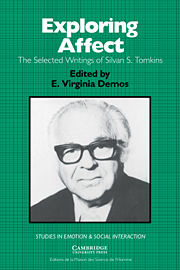Book contents
- Frontmatter
- Contents
- Foreword
- Editor's preface
- List of contributors
- Chronology
- Introduction
- Part I Affect theory
- Introduction
- Selections by Silvan S. Tomkins
- Part II Affect and ideology
- Introduction
- Selections by Silvan S. Tomkins
- Ideology and affect
- The socialization of affect and the resultant ideo-affective postures which evoke resonance to the ideological polarity
- Commentary: The ideology of research strategies
- Part III The face of affect
- Introduction
- Selections by Silvan S. Tomkins
- Part IV Script theory: The differential magnification of affect
- Introduction
- Selections by Silvan S. Tomkins
- Part V Human being theory: A foundation for the study of personality
- Introduction
- Selections by Silvan S. Tomkins
- A complete annotated bibliography of Silvan S. Tomkins's writings
- References
- Author index
- Subject index
- Titles in the series
Commentary: The ideology of research strategies
Published online by Cambridge University Press: 10 November 2010
- Frontmatter
- Contents
- Foreword
- Editor's preface
- List of contributors
- Chronology
- Introduction
- Part I Affect theory
- Introduction
- Selections by Silvan S. Tomkins
- Part II Affect and ideology
- Introduction
- Selections by Silvan S. Tomkins
- Ideology and affect
- The socialization of affect and the resultant ideo-affective postures which evoke resonance to the ideological polarity
- Commentary: The ideology of research strategies
- Part III The face of affect
- Introduction
- Selections by Silvan S. Tomkins
- Part IV Script theory: The differential magnification of affect
- Introduction
- Selections by Silvan S. Tomkins
- Part V Human being theory: A foundation for the study of personality
- Introduction
- Selections by Silvan S. Tomkins
- A complete annotated bibliography of Silvan S. Tomkins's writings
- References
- Author index
- Subject index
- Titles in the series
Summary
The two preceding papers by Cattell (chapter 16) and Holt (chapter 17) appear to have generated a discussion of one part illumination to two parts heat. As I listened to the enthusiastic recrimination between the rigorous, objective, psychometric multivariate experimentalists and the deep, sensitive clinicians I cannot escape the impression that we are host to an old familiar friend, the mote-beam mechanism. That we are united in our dissatisfaction with our present knowledge of the field of personality is abundantly clear. We differ only in our diagnosis of who shall be blamed, and how best each might atone and make restitution for his past sins and errors. It is not the first time that men have found it easier to tolerate their own failures when viewed, from a comfortable distance, in the behavior of others.
Our field is admittedly a difficult one, and our progress to date is somewhat less than the heart desires. Despite the revolutionary insights of Freud and the promise of factor analytic methods, there is an enduring, gnawing discontent which generates the flamboyant, inflated self-assertion of the clinician and factor analyst alike, and which also generates their mutually extrapunitive posture. To these somewhat jaded eyes and ears, the score is even, and lower than we would like it to be. It may well be that it will always so appear at the growing edge of our science or of any science.
- Type
- Chapter
- Information
- Exploring AffectThe Selected Writings of Silvan S Tomkins, pp. 196 - 204Publisher: Cambridge University PressPrint publication year: 1995



